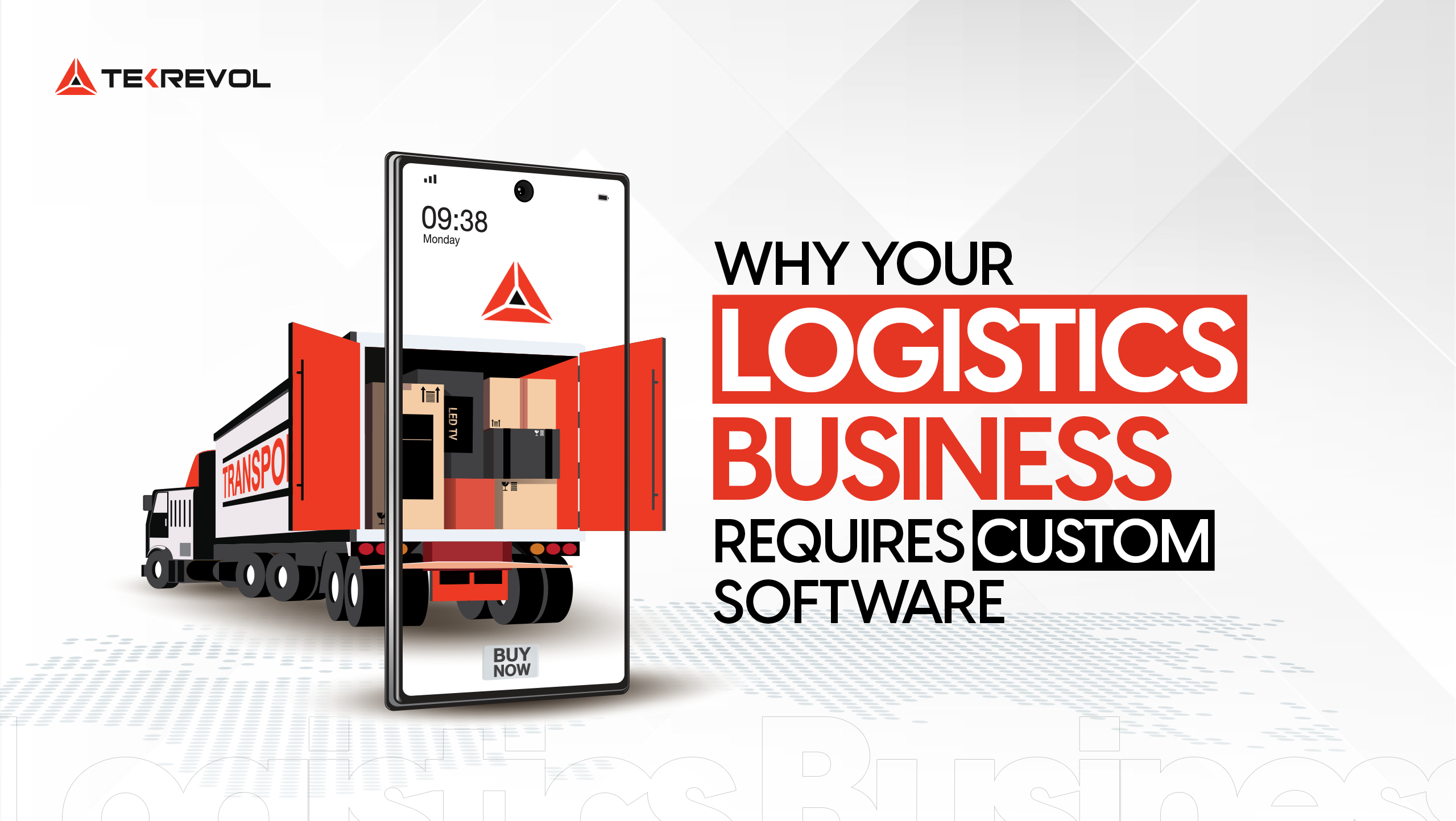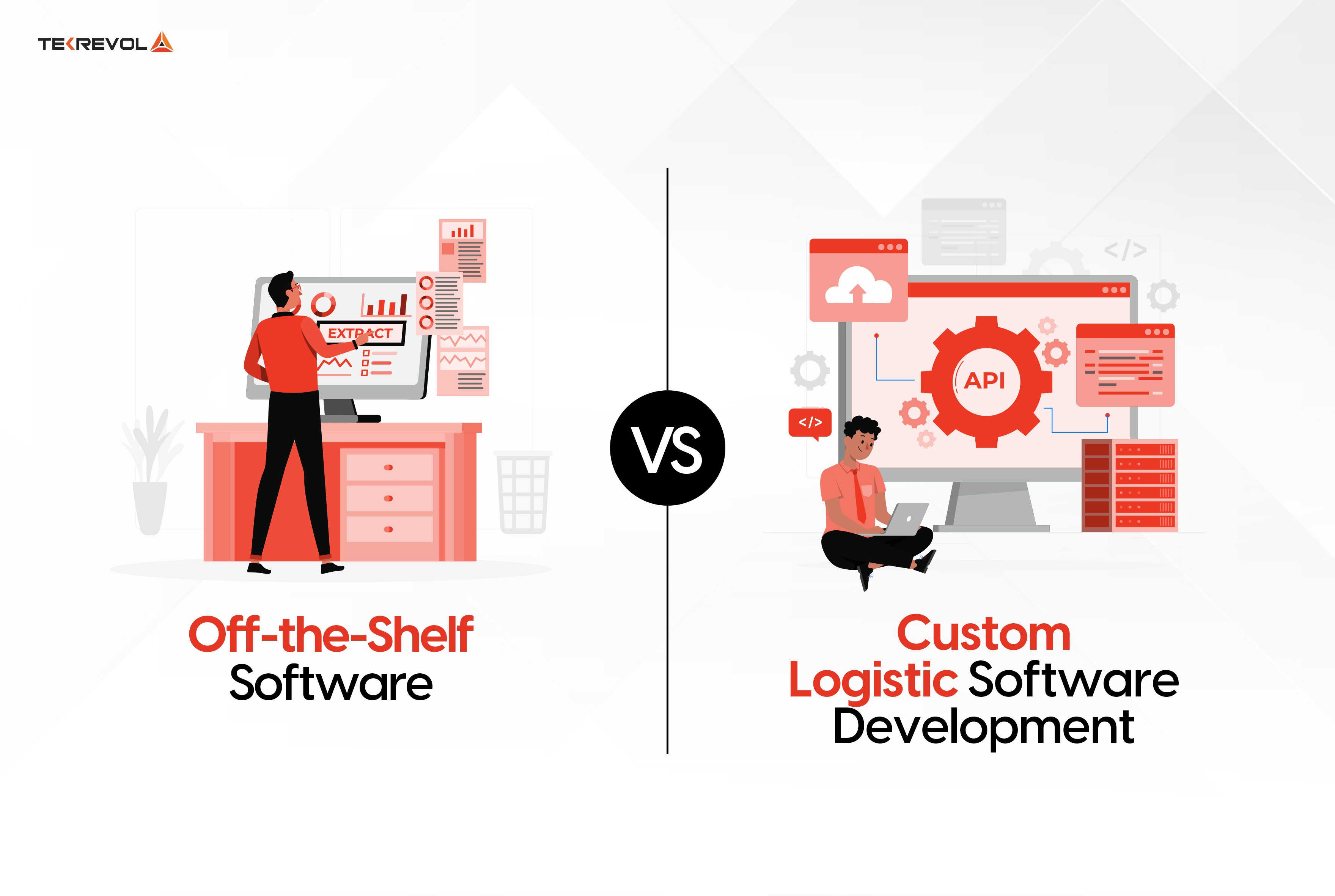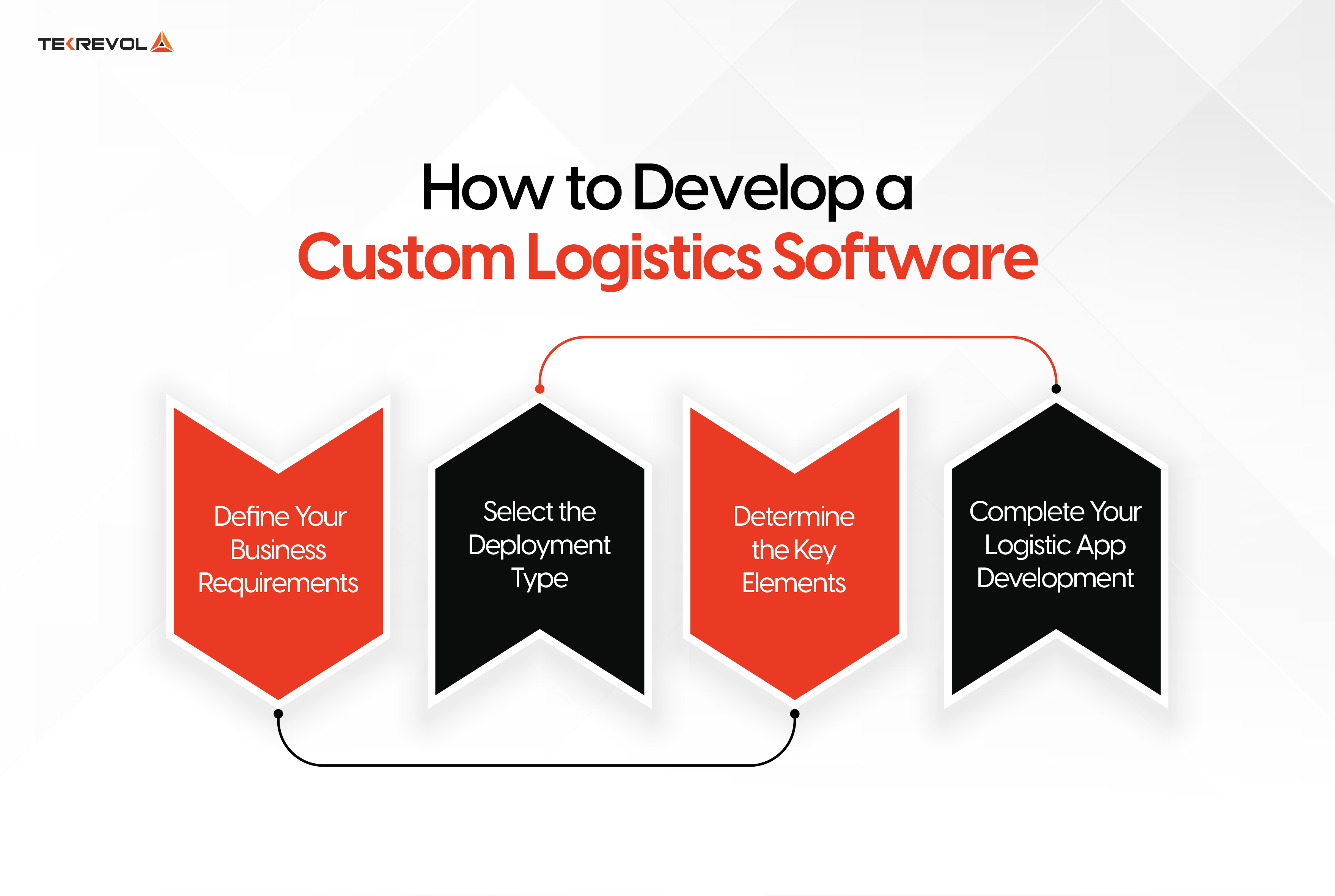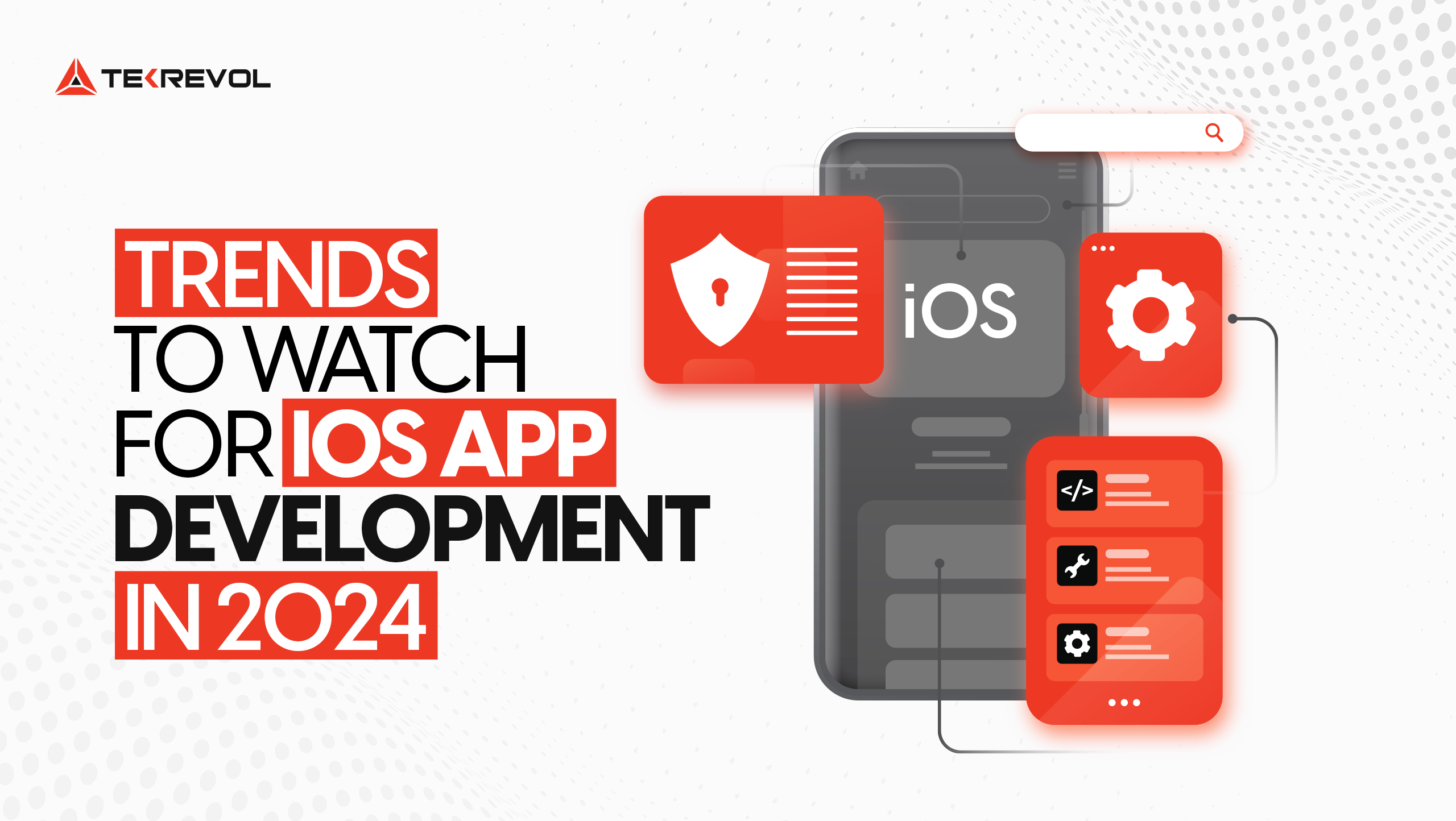Why Your Logistics Business Requires Custom Software: All You Need to Know
- Software Development
- |

The market is saturated with ready-made logistics software solutions, leading many companies to opt for custom logistics software development. This choice allows them to address unique operational needs that off-the-shelf options cannot meet.
Custom logistics software development is the most effective way to solve the specific requirements and complexities of modern supply chain management while saving time and costs.
Logistics software serves as the backbone of advanced operations, from managing complex supply chains to ensuring flawless transportation networks.
According to Statista, the worldwide supply chain management software industry keeps growing and is expected to exceed $10.17 billion by 2025.
By employing logistic software solutions, businesses can automate and optimize their operations, resulting in increased efficiency.
To ensure that the logistics software you need adds value to your business and works according to plan, seek an experienced logistics software development company.
They should leverage their expertise, industry knowledge, and technological capabilities to deliver customized solutions that align with your business goals and operational requirements.
With first-hand experience in developing corporate software, e-commerce, and logistics apps, TekRevol experts stand ready to assist you in planning and creating effective digital solutions for web, iOS, and Android platforms.
However, before we dive into the details, let’s understand what logistics software is, why you need custom logistics software, and how it can benefit your logistics industry.
- Ready to Enhance Your Logistics Operations??
- Optimize Efficiency with Our Expert Solutions!
What is Logistics Software Development, and How Can It Help Your Company?
Logistics software is designed to enhance the effectiveness and streamline workflows in various supply chain management procedures, such as transportation, inventory management, warehouse operations, and order processing.
Logistics software can offer various benefits to businesses, including increased operational efficiency, cost savings, and improved customer satisfaction.
Logistics software may assist your firm in plenty of ways, including:
- Improved route planning for optimized efficiency
- Reduced delivery times and streamlined operations
- Real-time tracking of all operations for increased visibility
- Fast communication for quick decision-making
- Speedy and in-depth data reports for informed insights
- Reduced transport expenses through optimized routes
- Reduced operational and maintenance costs
- Effective customer service to increase satisfaction
- Better supply chain management for flawless operations
- Reduced risk of human error for improved accuracy
Off-the-Shelf Software vs Custom Logistic Software Development

In logistics management, businesses often need to choose between purchasing off-the-shelf software and developing custom logistics solutions.
Each option comes with its own advantages and disadvantages tailored to specific business requirements and preferences.
Understanding the distinctions between these two methodologies is essential for making the right decision based on your company’s goals and nature.
So let’s simplify things. Here, we will describe the features of off-the-shelf logistic software:
Warehouse Management Platforms: Tracks inventory and manages distribution operations.
Enterprise Resource Planning (ERP) Systems: Manages accounting, purchasing, risk management, and compliance.
Supply Chain Management Solutions: Evaluates resources, and controls production, and overseas shipments.
Transportation Management Systems: These solutions aid in the coordination and execution of goods transportation, as well as ensuring compliance and accurate documentation of shipments.
To ease your understanding, we have provided a detailed breakdown of the differences in the table below:
| Features | Off-the-Shelf Logistic Software | Custom Logistic Software |
|---|---|---|
| ability | Readily available for immediate use | Developed specifically for your needs |
| Customization | Limited customization options | Fully customizable to suit your requirements |
| Cost | Generally lower initial cost | Higher initial investment but customized to your budget and needs |
| Scalability | Limited scalability as it’s pre-built | Highly scalable to accommodate growth and changes |
| Integration | May require additional integration efforts | Flawlessly integrates with existing systems |
| Functionality | Standard features and functionalities | Customized functionalities to address specific business needs |
| Support and Updates | Generic support and updates provided by a vendor | Customized support and updates customized to your software |
| Time to Deployment | Quick deployment as it’s readily available | Longer development time but aligned with your timeline |
| Competitive Advantage | Limited in providing a unique competitive edge | Offers a unique competitive advantage by addressing specific business challenges |
Moreover, with a custom solution, you can incorporate additional functionalities to improve staff efficiency.
For Example, Flexport offers specialized global logistics management in real-time, as well as supply chain insight. ShipBob offers customized e-commerce logistics solutions, including order administration and shipment efficiency.
Kuebix provides configurable transportation management with tools such as pricing control and carrier selection.
Step-by-Step Guide to Develop Custom Logistic Software

Logistics software development services are important to developing customized solutions for the transportation and supply chain industries.
However, these services range from early planning and design to implementation and extending support.
Let’s explore the essential steps involved in logistics software development:
Define Your Business Requirements
The first step is to write down your business’s objectives and describe the problems that the logistics software will solve.
For instance, if manual input and paperwork are causing delays in shipment processing and inventory record updates, logistics software can automate these activities by connecting with barcode scanners and RFID technologies.
On the other hand, if you’re impressed by Amazon’s automated fulfillment centers and want to use robotics and AI-driven automation to improve your warehouse operations, you may consider custom logistic software development services.
These services, with machine learning capabilities, can enhance inventory management, automate order fulfillment operations, and increase warehouse productivity by utilizing IoT sensors and predictive analytics.
Once you understand the desired functions of the software, determining the solution’s scope, deployment type, necessary features, and estimated cost becomes straightforward.
Select the Deployment Type: Cloud or On-Premises
Another important step is to choose the deployment strategy to ensure the flawless operation of the software.
The first approach is on-premises deployment, where all services are installed on the company’s physical hardware and servers. The objective of this approach is to provide the organization with the ability to control the running, management, and maintenance of the software in its entirety.
The on-premises deployment is less flexible and expensive because of the requirement of hardware investments and in-house maintenance teams.
However, the high level of security and the total control of the organization over its servers and backups are worth it ultimately.
On the other hand, cloud-based software deployment is entailed with the software being installed offsite, with the other company taking care of monitoring and maintenance. This option is usually cheaper, as it eliminates the need to buy extra equipment and the hiring of maintenance staff in-house.
For that reason, it’s best to consult with a reputable logistic software development company. They can help you choose the best deployment plan based on your unique needs, financial constraints, and long-term objectives.
Determine the Key Elements
It is important to analyze the needs and requirements of the business when choosing the features for the logistics platform. For example, in a food delivery app, real-time order monitoring and secure payment processing are important aspects, although route optimization for delivery drivers may be less important.
Similarly, in a medical supply chain management system, features such as inventory tracking with expiration date alerts and compliance with regulatory standards would be necessary.
To determine the necessary features, it’s helpful to choose a base system model that aligns with your business requirements. For example:
- Patient Management System (PMS) for a healthcare supply chain.
- Inventory Management System (IMS) for a retail distribution center.
- Fleet Management System (FMS) for a transportation company.
- Asset Tracking System (ATS) for equipment rental businesses.
- Vendor Management System (VMS) for procurement organizations.
- Customer Relationships Management (CRM) for managing customer interactions.
- Warehouse Management Systems (WMS) for optimizing warehouse operations.
- Supply Chain Management (SCM) for managing the flow of goods.
Complete Your Logistic App Development
Mobile apps are crucial for creating a unified network that links head offices to staff, ships, and vehicles, regardless of their location. Logistics mobile apps help access real-time company data to ensure smooth business operations.
For example, the company’s manager receives a real-time alert on the app indicating that an important shipment is delayed due to unexpected weather conditions. With instant details provided by mobile apps, they can promptly re-route the delivery, optimizing efficiency and eliminating disruptions.
As another example, apps enable drivers not only to forward documentation to warehouses but also to receive updates on traffic and weather conditions.
As you may understand, custom logistics software today is effective and capable of handling various aspects of traditional logistics. As an experienced logistics software development company, we help accelerate your business processes by developing software with advanced logistics functionalities, ensuring smooth operations, cost-effectiveness, and a competitive edge in the industry.
- Take the First Step Toward Advanced Logistics!
- Our Experts Can Assist You From Concept to Completion!
How Much Does It Cost to Develop Logistics Software?
The cost of logistics software development varies depending on multiple aspects such as the desired features, complexity, customization, and technology stack.
To get the estimated cost of your custom logistics software development project, you can use our user-friendly cost calculator.
You only need to input your project constraints, desired features, and functionalities, and receive a detailed estimated cost of your project.
- End the Confusion On Your Logistics Software Cost.
- Calculate Your Project Expenses with TekRevol's Handy Tool.
- Calculate Now!
Complexity
One of the main purposes of developing custom logistics software is that it performs all the tasks related to the industry.
For creating complex software that focuses on monitoring shipments, inventory management, and handling supply chain management, you may require advanced features. These features can be efficiently integrated to meet the challenges of your logistics business.
Therefore, the desired functionalities and features will impact the overall development cost. The more extensive the functionalities, such as real-time shipment monitoring, inventory management, and analytical capabilities, the higher the development cost is likely to be.
It is suggested to precisely analyze the needs of your business to ensure a customized logistics software solution that adds value within your budget.
Type of Deployment
As discussed earlier, logistics software can be deployed through either cloud-based or on-premises solutions.
On-premises deployment is more expensive because it requires operating the software on the client’s in-house servers, providing businesses with complete control over their logistics solutions.
On the other hand, cloud deployment costs less compared to on-premises deployment. It involves hosting the software on a third-party server
Essential Features for Web and Mobile App Development in Logistics Software
Another cost-affecting aspect of logistics software development is the necessary features and functionalities that should be integrated into both mobile and logistic app development.
Some common features are real-time shipment tracking, route optimization, inventory management, document management, reporting tools, and others.
But if you want to integrate more advanced external systems like ERP, CRM may cost you more, but the benefits in terms of improved data accuracy, modernized processes, and enhanced decision-making capabilities can outweigh the initial costs.
Choose the Right Logistic Development Company
Here, you have several options. You can hire an in-house team of developers, but this requires significant effort, time, and expenses.
Opting for off-the-shelf software may cost less, but it may not fully meet the unique requirements of your logistics operations.
The optimal choice is to hire a full-fledged logistics software development company to customize your software. They have years of experience in developing customized solutions for logistics industry requirements.
The customized solution will be efficiently implemented based on specifications and your company’s specific needs, all at a reasonable cost.
Why Choose TekRevol For Your Logistic Software Development?
In the competitive logistics industry, it’s essential to stand out and differentiate yourself to stay ahead in the market. Utilizing well-crafted logistics software helps you achieve your goals.
Select TekRevol as your trusted partner in logistics software development to streamline your processes, ultimately saving you from unnecessary hassles.
Our team of developers utilizes advanced technologies such as IoT-powered solutions, GPS tracking, built-in sensors, and more to create modern logistics software.
Schedule a free consultation with us by filling out the form, and we will promptly get back to you to discuss your challenges and suggest the best possible solutions to increase your ROI.
- Ready to Enhance Your Logistics Operations??
- Optimize Efficiency with Our Expert Solutions!
Frequently Asked Questions:
What is logistics software development?
Logistics software simplifies the automation of delivery processes for businesses, providing timely updates on shipments through tracking software. This system offers a broader assessment of the status of goods, facilitating better insights into their delivery, procurement, and overall logistics processes.
What is a logistics technology company?
Logistics technology can be described as digital tools and tech that allow logistics service providers to track, manage, and optimize logistics operations, processes, and workflows.
Meanwhile, the logistics company uses software and digital solutions for providing end-to-end supply chain software development services and logistics software.
How much time is needed to build a Logistic software?
It depends on multiple elements like complexity, features, functionalities, and available resources. However, the average software can take up to 3-6 months or longer. But if software is complex and needs serious technical skill, the more time it will take to build.
What are the top most popular logistic apps?
- Uber Freight
- Convoy
- Flexport
- ShipBob
- H. Robinson
What is the cost of developing logistics management software?
The cost to build logistic software depends on your project size, features, tech stack, customization, and integration requirements. So, it’s difficult to provide the estimated cost without detailed project requirements. You can use our cost calculator to get the exact quotation for your project.
Is it possible to integrate the logistics app with existing systems?
Yes, building apps for logistics often involves integrating them with already-existing systems. It guarantees smooth data transfer and communication between your app and other tools, improving overall functionality and efficiency.
How does logistics software work?
With the ability to accurately estimate demand, manage inventory, and analyze stock levels, logistics software assists businesses in optimizing their inventory levels.
By lowering carrying costs and eliminating stockouts or overstock situations, guarantees that inventory is managed correctly.
Author : Aqsa K.
A dedicated content marketing enthusiast with a keen eye for storytelling, delves into the world of communications armed with a Bachelor's degree in Media. Her passion lies in crafting compelling narratives that resonate across varied audiences.
Come meet us at a location near you!
 USA
USA
39899 Balentine Drive,
Newark, CA 94560
1301 Fannin St #2440,
Houston, TX 77002
501 E Las Olas Blvd Suite
230, Fort Lauderdale, FL
44 Tehama St, CA 94105, San Francisco
400 NW 26th St, FL 33127, Miami
740 15th St NW 8th Floor, DC 20005, Washington
 CANADA
CANADA
4915 54 St 3rd Floor
Red Deer, ABT T4N 2G7
 UAE
UAE
Level 5, One JLT Tower 1 - Jumeirah Lakes Towers - Dubai, United Arab Emirates
Level 17, World Trade Center, Khalifa Bin Zayed the First Street, Abu Dhabi
Level 22 , West Tower, Bahrain Financial Harbour, Manama, Bahrain
Level 22, Tornado Tower, West Bay, Doha, Qatar
 PAKISTAN
PAKISTAN
3/25, Block 5, Gulshan-e-Iqbal,
Karachi, Sindh 75650




Let’s get in touch!
Let’s discuss your project and find out what we can do to provide value.
I am interested in discussing my ideas with you for
COPYRIGHT 2024 TEKREVOL ALL RIGHTS RESERVED.





